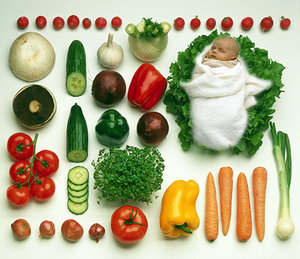Recently, on one of the acupuncture alumni forums, the topic of age and fertility came up when a practitioner posted a question regarding a patient that was about to turn 40-years-old. Her main concern was what she could tell her patient, who was at the moment, uncoupled and wanting to preserve her fertility.
As an acupuncturist who has worked with hundreds of women who were trying to conceive, I can say from 10 years of clinical experience, age is not our biggest issue when it comes to fertility. In fact, recent data shows that a women's odds of conceiving within one year of trying from age 35 to 40 is only about 7% to 8% less than that of a women aged 27 to 30 (check out this article for more info). There is emerging scientific research that supports the fact that physiological age (meaning how old our cells are) plays a much greater role in fertility (and health) than does chronological age (how many years old we are) (www.ncbi.nlm.nih.gov/pmc/articles/PMC3857638/; www.rbej.com/content/7/1/101). Yet, the media and the western medical system has age as the centerpiece of the infertility conversation. I want to stress to all practitioners that we need to stay abreast of the current research and resist falling prey to media hypes.
In my clinic, when I guide my patients to make positive lifestyle adjustments, they are able to achieve a healthy pregnancy later in life. Currently, I have a couple in my practice who unfortunately have been in the throes of fertility treatments for more than five years (and are still without a child). This past year, after following a nutrient dense diet free of processed and refined foods, receiving regular acupuncture, taking Chinese herbs, meditating, sleeping 7 to 8 hours/night, focusing on gratitude, making time for "date-night" and taking anti-oxidant rich supplements for a few months had, at the age of 44, the best in vitro fertilization (IVF) outcome they have ever had. They are happily 20 weeks pregnant at the moment. Yes, they did IVF. However, they have done several IVF treatments and this go around the doctors were amazed at the sperm and egg quality they produced. It was the best sperm and egg quality they have ever produced. Translation: chronological age, for this couple, was not the biggest issue.
 Something to ponder: How can an aging couple in their 40's produce better sperm and eggs than they did five years prior? In my clinical opinion, it's called achieving a state of optimal health.
Something to ponder: How can an aging couple in their 40's produce better sperm and eggs than they did five years prior? In my clinical opinion, it's called achieving a state of optimal health.
I have seen cases like this over and over again. In fact, the fertility doctors I have spoken to have as well. We all agree that there is a big difference between chronological age and physiological age. When it comes to fertility, physiological age is what matters, not chronological age. Of course, at some point, when a woman is around 49 or 50 and her menstrual cycle ceases, pregnancy cannot (naturally) occur, but I'm talking about women in their reproductive years who are menstruating and ovulating with regularity.
The work we do with our patients should be primariiliy focused upon optimizing health; mentally, emotionally, nutritionally and physically. It is when we focus on all of these components of health that overall physiology will shift and improve. It's not just about acupuncture and Chinese herbs — its about diet and emotions, too. We must approach all of our patients in this holistic way, with a good amount of focus on the mental/emotional component to health. Science shows that happier people are healthier people. People who meditate have younger cells than people who don't. People who sleep more, age better. And, most importantly, people who believe in the body's health fare much better in the face of illness (I encourage all of you to watch the documentary "The Connection").
When it comes to our patient's fertility, I urge you all to think less about age and more about overall health. And be clear to all your patients that improving health is not about a five-day juice cleanse or a two-week detox diet. Rather, it's about guiding our patients to consistently make choices that support a healthy lifestyle. Contrary to popular belief: we can deter the aging process, we can be healthier now than we were five years ago and we can improve egg and sperm quality and the overall internal environment of the body and the reproductive system (google the word epigenetics and read the science behind all of this). As practitioners, we should be armed with this information so that we can best treat our patients and guide them back to a state of optimal health.
And, most importantly, it is part of our job to remind our clients that they can take back the power and improve their health and ultimately their fertility. We should encourage our patients to shift their mindset from one of lack to one of gratitude. We need to optimistically guide them to make better lifestyle choices and remind them that they can shift their health and optimize their fertility, even in their late 30's and 40's.
I've seen it happen in my clinic hundreds of times. When it comes to age and fertility, question the Western dogma and rather positively support your patient on their path. Let's, remind them that their physiology can shift for the better, even as they age. And, if you don't believe that they can shift their health and fertility, then you should reconsider treating them, as I believe our primary goal is to see the wellness in our patients.
Click here for previous articles by Aimee Raupp, LAc.




